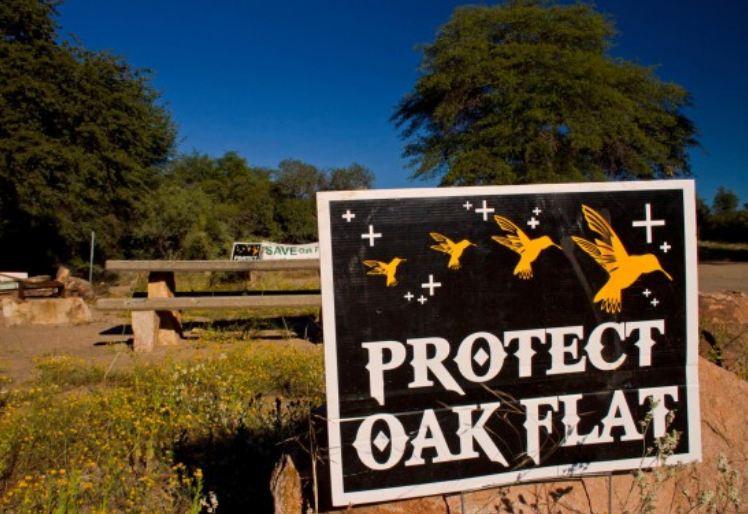
- Details
- By Kaili Berg
Breaking News. The United States Supreme Court on Tuesday announced it has declined to hear Apache Stronghold v. United States, a case that could have shielded the sacred Western Apache site of Oak Flat from being turned into a massive copper mine.
The decision clears the way for the federal government to transfer the land to Resolution Copper, a company largely owned by the Chinese government through its shareholder, Chinalco.
Oak Flat, known in Apache as Chi’chil Bildagoteel, is located east of Phoenix in Arizona and has long been a site of prayer, ceremony, and cultural identity for the Western Apache.
It’s listed on the National Register of Historic Places and recognized as a Traditional Cultural Property. Religious ceremonies held there cannot be relocated elsewhere.
Despite its significance, protections for the site were undermined in 2014 when a land swap deal benefiting Resolution Copper was quietly added to a must-pass defense bill in Congress. If allowed to proceed, the company plans to create a crater nearly two miles wide and over 1,000 feet deep, destroying the sacred landscape.
Apache Stronghold, a grassroots coalition made up of Native and non-Native allies, filed suit in 2021 in hopes of stopping the transfer and preserving the area for religious use.
The effort has gained broad tribal and public support, with 21 of Arizona’s 22 federally recognized tribes opposing the mine, along with the National Congress of American Indians. Polling has shown that three-quarters of Americans also favor protecting Oak Flat.
Earlier this year, the Ninth Circuit ruled against the Apache plaintiffs, stating that the land transfer doesn’t violate federal religious freedom protections. However, five judges dissented, saying the ruling failed to uphold the First Amendment.
“It is hard to imagine a more brazen attack on faith than blasting the birthplace of Apache religion into a gaping crater,” Luke Goodrich, senior counsel at Becket, a legal group representing Apache Stronghold said in a press release. “The Court’s refusal to halt the destruction is a tragic departure from its strong record of defending religious freedom.”
The case has become a flashpoint in the national debate over Indigenous religious freedom, corporate mining interests, and U.S. obligations to tribal nations. Resolution Copper’s parent company, Rio Tinto, has already been at the center of a global scandal for destroying sacred Aboriginal sites in Australia.
“We will never stop fighting, nothing will deter us from protecting Oak Flat from destruction,” Dr. Wendsler Nosie Sr., a former San Carlos Apache tribal chairman and leader of Apache Stronghold, said in a statement. “While this decision is a heavy blow, our struggle is far from over. We urge Congress to take decisive action to stop this injustice while we press forward in the courts.”
More Stories Like This
Native News Weekly (August 25, 2024): D.C. BriefsScope Narrowed, Report Withheld: Questions Mount Over Michigan Boarding School Study
Zuni Youth Enrichment Project Announces Family Engagement Night and Spring Break Youth Programming
Next on Native Bidaské: Leonard Peltier Reflects on His First Year After Prison
Deb Haaland Rolls Out Affordability Agenda in Albuquerque
Help us defend tribal sovereignty.
At Native News Online, our mission is rooted in telling the stories that strengthen sovereignty and uplift Indigenous voices — not just at year’s end, but every single day.
Because of your generosity last year, we were able to keep our reporters on the ground in tribal communities, at national gatherings and in the halls of Congress — covering the issues that matter most to Indian Country: sovereignty, culture, education, health and economic opportunity.
That support sustained us through a tough year in 2025. Now, as we look to the year ahead, we need your help right now to ensure warrior journalism remains strong — reporting that defends tribal sovereignty, amplifies Native truth, and holds power accountable.
 The stakes couldn't be higher. Your support keeps Native voices heard, Native stories told and Native sovereignty defended.
The stakes couldn't be higher. Your support keeps Native voices heard, Native stories told and Native sovereignty defended.
Stand with Warrior Journalism today.
Levi Rickert (Potawatomi), Editor & Publisher


